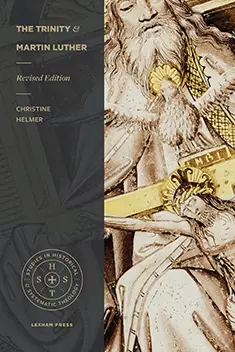

The Trinity and Martin Luther
in Studies in Historical and Systematic Theology
Pages
320
Publisher
Lexham Press
Published
1/1/2017
ISBN-13
9781683590507
Martin Luther was classically orthodox.
Scholars often portray Luther as a heroic revolutionary, totally unlike his peers and forebears—as if he alone inaugurated modernity. But is this accurate? Is this even fair? At times this revolutionary model of Luther has come to some shocking conclusions, particularly concerning the doctrine of the Trinity. Some have called Luther modalist or tritheist—somehow theologically heterodox.
In The Trinity and Martin Luther Christine Helmer uncovers Luther’s trinitarian theology. The Trinity is the central doctrine of the Christian faith. It’s not enough for dusty, ivory tower academics to know and understand it. Common people need the Trinity, too. Doctrine matters.
Martin Luther knew this. But how did he communicate the doctrine of the Trinity to lay and learned listeners? And how does his trinitarian teaching relate to the medieval Christian theological and philosophical tradition?
Helmer upends stereotypes of Luther’s doctrine of the Trinity.
This definitive work has been updated with a new foreword and with fresh translations of Luther’s Latin and German texts.
Scholars often portray Luther as a heroic revolutionary, totally unlike his peers and forebears—as if he alone inaugurated modernity. But is this accurate? Is this even fair? At times this revolutionary model of Luther has come to some shocking conclusions, particularly concerning the doctrine of the Trinity. Some have called Luther modalist or tritheist—somehow theologically heterodox.
In The Trinity and Martin Luther Christine Helmer uncovers Luther’s trinitarian theology. The Trinity is the central doctrine of the Christian faith. It’s not enough for dusty, ivory tower academics to know and understand it. Common people need the Trinity, too. Doctrine matters.
Martin Luther knew this. But how did he communicate the doctrine of the Trinity to lay and learned listeners? And how does his trinitarian teaching relate to the medieval Christian theological and philosophical tradition?
Helmer upends stereotypes of Luther’s doctrine of the Trinity.
This definitive work has been updated with a new foreword and with fresh translations of Luther’s Latin and German texts.
- Table of contents
- Introduction
- Luther’s Understanding of the Trinity in the Doctoral Disputation of Georg Major and Johannes Faber (Dec. 12, 1544)
- Luther’s Understanding of the Trinity in the Hymn, “Nun Freut Euch, Lieben Christen Gmein” (1523)
- Luther’s Understanding of the Trinity in the Two Sermons On Romans 11:33–36 Preached on Trinity Sunday, May 27, 1537, and on the First Sunday After Trinity, June 3, 1537